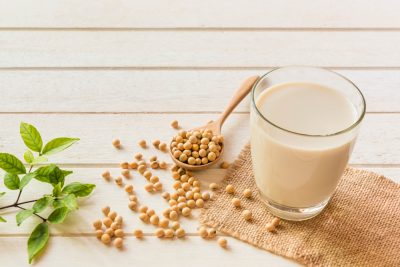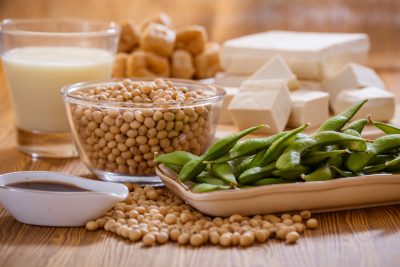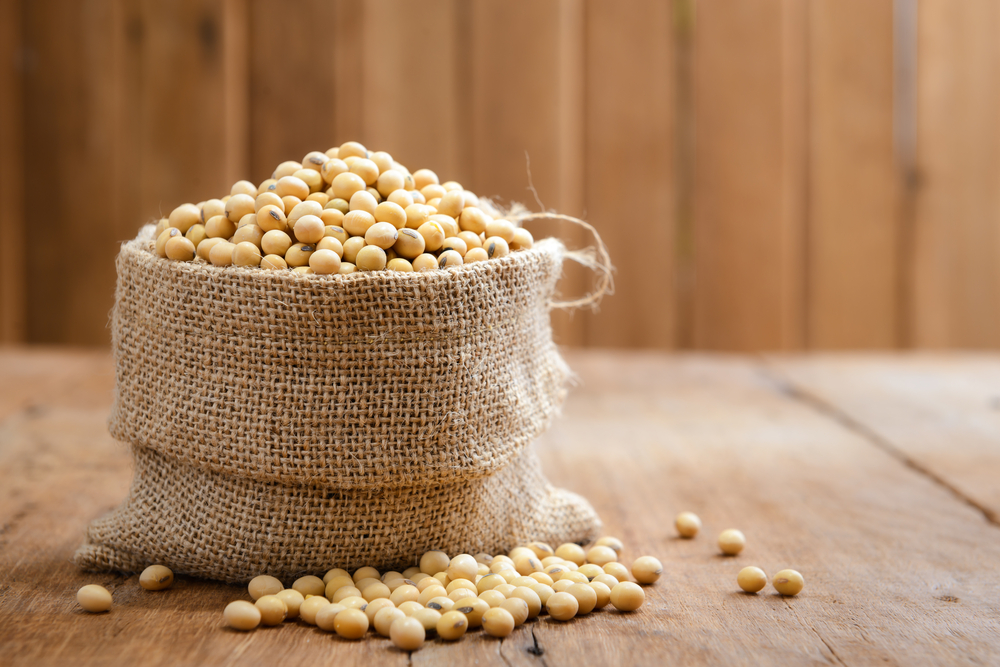Soy is an amazing source of plant-based protein. Enriched with essential amino acids, people mostly use soy for fitness purposes throughout the world. It is easy to find soy in various forms around you, such as in protein-rich smoothies and post-workout bars.
According to the FDA’s guidelines, you should consume some amount of soy in any form for potential health benefits of your heart and cardiovascular system (Source).
Some people consider soy as a testosterone killer and an estrogen booster. So today, we are going to discuss whether soy lowers the level of testosterone in the body or not.
Different Types of Soy
There are different types of soy that we can consume, processed or otherwise. Here are some of the most popular forms of soy:
Whole Soy Products
Whole soy products include edamame and soybeans and are the least processed form of soy protein. These are green and immature soybeans. Tofu and soymilk come from whole soybeans (Source). However, in Asian cuisines, edamame is among the population’s favorite high-protein foods.
Producers extract soy milk through a process that includes soaking whole soybeans and grinding them. After that, they boil them and filter out all the solids. People who avoid dairy products or suffer from lactose intolerance commonly use this as a milk alternative.
You can make tofu by clotting soy milk and then pressing the curds in the form of blocks. Tofu is a common source of protein for vegetarian diets as it is a plant based-based protein.
Fermented Soy
The traditional methods help process fermented soy and contain natto, miso, tempeh, and soy sauce (Source). Soy sauce is in liquid form made up of:
- Saltwater
- Roasted grains
- A type of mold
- Fermented soy
Tempeh has its origins in Indonesia and is a fermented soy cake. It is not as popular as tofu. People usually use this as a source of protein in their vegetarian diet.
Miso is a paste that originated from Japan traditionally and includes:
- A type of fungus
- Salt
- Soybeans
Soy-based Processed Foods
 Soy is an ingredient in various processed foods, such as:
Soy is an ingredient in various processed foods, such as:
- Different types of cheese
- Yogurts
- Vegan and vegetarian meat substitutes
You can find soy flour, soybean oil, and texturized vegetable protein, many packed foods.
Soy Supplements
This isolated soy protein is the result of grinding soybeans in flakes and then extracting the oil. Then, producers blend these flakes with alkaline water or alcohol.
They heat the resulting solution and spray the residue into powder (Source). These isolates of soy protein are one of the ingredients in various protein powders as well as processed foods, for example, shakes and protein bars.
Other soy-based supplements are soy isoflavones, available as capsules, and soy lecithin, which comes as both powder and capsules.
Why Eat Soy?
Soy is a source of affordable, high-quality protein and many other nutrients that are useful for the body. You can eat these beans directly or turn them into imitation meat, tempeh, tofu or even milk.
Adding these beans with the meat and cooking can add additional flavor and protein. Furthermore, these are also available in protein powders. When people try to quit eating soy, they quickly experience withdrawal effects throughout their bodies.
Manufacturers often use it in whey protein powder as soy lecithin. This fatty substance present in the oil works as an emulsifier and is good for improving mixability in the product. Moreover, soybean oil is also important to fry food, baked goods, and candy bars. It is a common ingredient in soap. Soy is hard to avoid.
Here are some benefits of soy that you should know:
♦ When you eat soy, you increase the plant protein in your body. Adding more plant protein in the diet is beneficial for your cardiovascular system. For instance, it helps in lowering your blood pressure.
♦ Foods processed with soy are naturally low in saturated fat and are cholesterol-free. Foods that are high in cholesterol and saturated fat increase your risk of creating cardiovascular diseases.
♦ You can consume soy in order to reduce your risk of various diseases and help to cut saturated fats.
♦ You can boost your intake of fiber by consuming soy-based foods. Fiber helps in promoting a healthy gastrointestinal system, reducing the risk of creating cardiovascular disease in the body, and lowering cholesterol levels. You can add black soybeans, green soybeans, soy nuts, tempeh, and soy flour in your diet as these are fiber-rich foods and helps in boosting your daily dietary fiber.
♦ Soy foods are one of the best sources of polyunsaturated fat. They offer a number of benefits in terms of heart health, thanks to polyunsaturated fats, for example lowering the levels of cholesterol. You can benefit from choosing these processed foods to build these heart-friendly fats.
♦ Other than polyunsaturated fats, soy foods also contain omega-3 fats. These fats help in lowering your risk of developing cardiovascular diseases.
♦ Soy foods are also essential for various minerals and vitamins. These nutrients include zinc, iron, antioxidants, B-vitamins. Furthermore, many soy foods also contain calcium, B 12, and vitamin D that help vegetarians in completing their nutritional needs.
♦ Soy is also a great source of phytochemicals. The phytochemicals present in soy are These phytochemicals are essential in preventing certain cancers and bone loss. For further information regarding the role of soy for cancer treatment, you can contact the American Cancer Society at www.cancer.org.
The Soy and Testosterone Relationship
Some studies are fueling the frenzy on this topic. However, most of these studies are the result of a small number of tests and do not contain crucial data. We can clearly say that these tests are flawed, and our understanding can’t depend on these studies.
In a small study that includes young and healthy males, it was found that by taking two pure soy protein powder scoops, testosterone levels decreased by 19 percent. If they skip protein powder, their levels increase within two weeks. But still, this is a study based on a small group of people, so we cannot depend on this study (Source).
Soy protein contains an abundant amount of phytoestrogen isoflavonoids, which changes into estrogenic substance. These substances have properties of potential hormones.
According to a study on fertility and sterility, 15 placebo treatment, and 32 reports by the researchers suggested that soy protein does not affect the level of testosterone in men (Source).
Why You Should Eat Moderate Amount of Soy
If you have abnormal hormone levels, you should check the amount of soy you are consuming. As estradiol converts in body fats from testosterone, we can say that men with higher body fat percentage have higher levels of estradiol.
If your body has high levels of estrogen, you should consume moderate amounts of soy. This will decrease the overall levels of estrogen. Excessive soy consumption will increase your estrogen levels.
How Much Soy You Can Eat
It is obvious that you cannot get all the protein from soy only. You need to add a variety of foods in your diet for balanced nutrients. Here is a list of soy foods that you can include in your daily diet. However, you need to add other protein sources also.
 24 grams of soy protein
24 grams of soy protein
- 3 ounces of tempeh
- 1 cup of soymilk
26 grams of soy protein
- 1/4 block of extra-firm tofu
- 1/2 cup of shelled edamame
- 1 cup of sweetened soy yogurt
58 grams of soy protein
- 1 soy protein bar
- 1 scoop of soy protein powder
According to experts, if you’re consuming soy-rich food throughout the day, you are consuming too much of it, which is harmful. You need to keep yourself in the range and depend on two to three servings.
You should also take into consideration that many processed foods that we consume contain soy, and we don’t even know.
Most men eat edamame, which is nutrient-rich and high in fiber. Some consume whole soy as it is concentrated. Foods like salad dressings, bread, cereals, etc. contain whole soy.
Consuming excessive amounts of soy will only put excessive stress on your body. Moderate quantity is sufficient for the body. You should also consume a variety of other protein sources.
Conclusion
If you are consuming a regular soy diet, you do not have to worry. You can get plant protein with other beans, also such as nuts, quinoa, lentils, and seeds, to preserve your active lifestyle. We do not have any proper data concluding that soy affects muscle growth negatively and lowers the levels of testosterone in men.
A clinical trial found that 22 grams of soy protein supplements did not alter the testosterone level. Researchers performed the study on young men who worked out and continued the study for three months (Source).
If you are consuming a normal amount of soy and are still concerned about low levels of testosterone, your diet is not the issue. You should consult your doctor or try consuming natural testosterone boosters.








COMMENTS